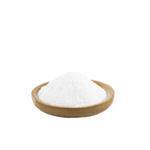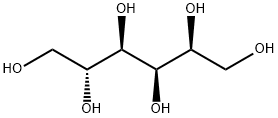D-Sorbitol: Metabolism in Plants, Biosynthesis and Degradation
May 15,2024
General Description
D-Sorbitol, a key metabolite in plants, is synthesized through the action of D-sorbitol-6-phosphate dehydrogenase (S6PDH) and D-sorbitol-6-phosphate phosphatase (S6PP). These enzymes play vital roles in converting glucose to sorbitol and vice versa. Sorbitol metabolism is crucial for osmotic regulation and stress responses in plants. Additionally, D-sorbitol degradation, primarily catalyzed by NAD-SDH, influences the balance between D-sorbitol and fructose levels in fruits, impacting fruit quality and storage. Understanding these processes is essential for enhancing crop productivity and stress tolerance through genetic engineering.

Figure 1. D-Sorbitol
Metabolism in Plants
D-Sorbitol, also known as glucitol, was first isolated from the plant Sorbus aucuparia in 1872 by French chemist Joseph Boussingault. It is a reduced form of glucose. While the term "glucitol" is occasionally used in older literature, "sorbitol" is the more commonly recognized name today. D-Sorbitol serves as the main photosynthetic product in certain plant species from the Rosaceae and Plantaginaceae families, which are referred to as "usual sorbitol producers". In these plants, D-sorbitol metabolism plays a crucial role in various physiological processes, including osmotic regulation, carbon storage, and stress response. Understanding sorbitol metabolism in plants is essential for elucidating the mechanisms underlying their adaptation to environmental stresses and for potentially enhancing crop productivity and stress tolerance through genetic engineering approaches. 1
Biosynthesis
D-Sorbitol biosynthesis is a complex process involving key enzymes such as sorbitol-6-phosphate dehydrogenase (S6PDH) and sorbitol-6-phosphate phosphatase (S6PP). S6PDH, originally discovered in fruits of Eriobotrya japonica, plays a crucial role in catalyzing the conversion of D-glucose 6-phosphate (G6P) to D-sorbitol 6-phosphate (S6P) and vice versa. This enzyme has been identified in various rosaceous plants, indicating its importance in sorbitol synthesis across different species. The activity of S6PDH is influenced by factors such as pH, with optimal pH levels varying for G6P reduction and D-sorbitol 6-phosphate oxidation. Additionally, the enzyme's activity is regulated by cofactors like Pi and nucleotide di- or triphosphates. High cytosolic Pi levels can indicate carbon starvation or high sorbitol/sucrose synthesis rates, affecting D-sorbitol-6-phosphate dehydrogenase function. sorbitol-6-phosphate dehydrogenase exhibits substrate specificity, requiring a free aldehyde group at C1 and specific hydroxyl group configurations for efficient catalysis. While it can efficiently reduce galactose 6-P, other substrates like fructose 6-P are not suitable for sorbitol biosynthesis via this enzyme. Overall, D-sorbitol-6-phosphate dehydrogenase plays a crucial role in sorbitol biosynthesis, especially in mature leaves where it is predominantly active in chloroplasts and cytosol. Understanding the mechanisms and regulation of S6PDH activity provides insights into the complex process of sorbitol production in plants. 2
Degradation
D-Sorbitol degradation in plants, particularly in economically significant rosaceous fruits, has been extensively studied. D-Sorbitol, a polyol, undergoes degradation primarily to fructose or glucose through various enzymatic pathways. In higher plants, the oxidation of sorbitol to fructose is facilitated by NAD+ dependent sorbitol dehydrogenase (NAD-SDH), also known as glucitol dehydrogenase or ketose reductase. This enzyme, first characterized in Malus domestica, exhibits considerable substrate flexibility, metabolizing not only D-sorbitol but also other polyols like xylitol and L-threitol. The reversible reaction catalyzed by NAD-SDH occurs optimally at different pH levels for sorbitol oxidation and fructose reduction. Despite the pH disparity, in vivo experiments suggest a preference for sorbitol oxidation, favoring the conversion of D-sorbitol to fructose, particularly in apple fruits. Furthermore, comparisons of Michaelis constants indicate a higher affinity for sorbitol oxidation over fructose reduction. Interestingly, NAD-SDH shows affinity for ethanol and can metabolize other ketoses besides fructose, such as L-sorbose, D-ribulose, and D-xylulose. This broad substrate specificity hints at potential connections with alcohol dehydrogenase, suggesting shared structural and evolutionary relationships between sorbitol dehydrogenases and alcohol dehydrogenases. In summary, D-sorbitol degradation in plants, mediated primarily by NAD-SDH, plays a crucial role in fruit metabolism, influencing the balance between sorbitol and fructose levels, with implications for fruit quality and storage characteristics. 2
Reference
1. ADCOCK LH, GRAY CH. Metabolism of sorbitol. Nature. 1956; 177(4503): 329-330.
2. Pleyerová I, Hamet J, Konrádová H, Lipavská H. Versatile roles of sorbitol in higher plants: luxury resource, effective defender or something else?. Planta. 2022; 256(1): 13.
- Related articles
- Related Qustion
- The application of sorbitol Oct 13, 2023
Sorbitol is a sugar alcohol with a sweet taste that the human body metabolizes slowly. Its calorie is 2.6 kilocalories (11 kilojoules) per gram.
- The Function of Sorbitol Nov 30, 2022
Two areas where sugar alcohols are known for their positive effects are oral health and impact on blood sugar.
Eugenol from clove oil exhibits antioxidant and antimicrobial properties, scavenging free radicals and disrupting bacterial membranes, suggesting potential for medical applications.....
May 15,2024APITrifluoromethyl iodide, often abbreviated as CF3I, is a remarkable chemical compound that has garnered significant attention within the scientific community.....
May 15,2024APISorbitol
50-70-4You may like
- D-Sorbitol
-

- $6.00 / 1kg
- 2024-05-18
- CAS:50-70-4
- Min. Order: 1kg
- Purity: More than 99%
- Supply Ability: 2000KG/Month
- Sorbitol
-

- $500.00/ kg
- 2024-05-14
- CAS:50-70-4
- Min. Order: 1kg
- Purity: 99%
- Supply Ability: 100 tons
- Sorbitol
-

- $18.00 / 10kg
- 2024-05-08
- CAS:50-70-4
- Min. Order: 1kg
- Purity: 99.9
- Supply Ability: 5000




